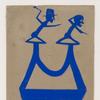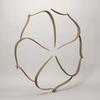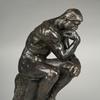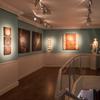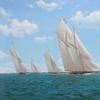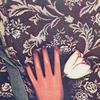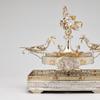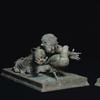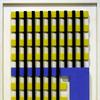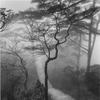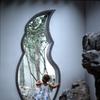"Overture: Recent Acquisitions from the Borusan Contemporary Art Collection," Pop-Up Exhibition of Time-Based Art Presented in New York City
- NEW YORK, New York
- /
- August 07, 2017
Drawn from the Borusan Contemporary Art Collection in Istanbul, Turkey, an exhibition of recent media arts acquisitions will be on view in a temporary space at 208 Bowery in New York City, October 12–November 4, 2017. Overture: Recent Acquisitions from the Borusan Contemporary Art Collection features time-based work by an international roster of influential artists: Jim Campbell, Daniel Canogar, U-Ram Choe, John Gerrard, Claudia Hart, Ali Kazma, Michal Rovner, and Allard van Hoorn.
Organized by Kathleen Forde, Borusan Contemporary’s Artistic Director at Large, the works on view explore a range of perspectives including an attention to human perception and memory and shifting concepts of identity and environment. “The selection also functions as a vibrant embodiment of the geographic reach, aesthetic range, and diversity of practices represented in Borusan Contemporary’s recent collecting activities in media arts. The works span digitized landscapes and recently commissioned videos to simulations, kinetic work, and beyond,” said Forde.
Jim Campbell’s Grand Central Station (2009) monitors the passage of commuters through Grand Central Terminal in New York. It incorporates low-resolution video-based imagery and a color photographic transparency mounted on brackets in front of a panel of white LEDs. The exposure time is the duration of an average New York commuter's footstep. Once every 34 minutes, the photographic and video imagery align for a fleeting moment. Campbell intends this work to be part of an ongoing series which measures time with natural rhythms.
Based in Madrid and New York, Daniel Canogar employs a variety of mediums in his practice including photography, video, sculpture, and installation. The artist reclaims discarded consumer electronics and reanimates them to revive collective memory. In Hipocampo 2 (2010), he explores the ephemerality of a telephone signal that serves as a metaphor for technological mortality. A relic in the age of information, the discarded telephone cable wires were found in a dumpster near the artist's home. Flickering with light and emitting buzzing static sound, the illuminated cables evoke neural synapses firing in the brain and crackling communications from an earlier time.
Korean artist U-Ram Choe is known for his complex kinetic sculptures incorporating stainless steel, robotics, biology, mathematics, computer technology, and mechanical engineering. Una Lumino Portentum (2008), a graceful robotic sculpture, comprises mechanical floral forms with life-like “petals” that open and close, illuminate and darken. His biomorphic subjects are accompanied by ersatz scientific documents and given Latin names to echo scientific nomenclature.
Working in Dublin and Vienna, John Gerrard’s Sow Farm (near Libbey, Oklahoma) (2009) is a simulation depicting an agricultural complex on the American Great Plains. Each of the corrugated iron sheds that come into view houses a large but unseen community of adult female swine engaged in mass farrowing (giving birth to piglets). Gerrard’s work frequently refers to structures of power and networks of energy that have made possible the expansion of human endeavor in the past century.
Claudia Hart is an artist, curator, and critic based in Chicago. Her practice addresses issues of representation and the role of the computer in shifting contemporary values about identity and what might be called the natural. The Seasons (2009) portrays a room in which a slowly evolving sculptural figure of a seated woman gradually transforms. In the animated loop, a variety of visual, temporal, and conceptual cycles are offset and overlaid so that their movement is obscured. As in life, movement occurs but time seems to stand still.
Istanbul-based video artist Ali Kazma’s Written (2011) shot in the artist’s studio, concentrates on Kazma’s fascination with texts. In this six-channel video installation featuring quotations taken from his reading notes, Kazma utilizes the digital medium of filming and editing. Words on paper are shown burning with footage played in reverse causing the quotations to reappear. Nothing completely disappears, language remains, and words endure while ashes turn into flame. Every screen shows a different state of generation and regeneration that creates a feeling of flux and dynamism. No matter how long the spectator remains to contemplate the natural phenomena of physical and intellectual construction, destruction, and reconstruction, each incomplete passage facing the fire points to a totality that remains hidden. An intuitive yet precise rhythm of light and dark and shifting perspectives pulsates on the screens to create a visual crucible out of the excerpts.
Michal Rovner, based in New York and Israel, uses digitally manipulated photography and film to create installations based on abstracted human and natural forms. Black Forest (2016) was made using night-vision photographic equipment. The work features spectral gray images of jackals at night. While Rovner compares the images to daguerreotypes, they are grainier and more ghostly, with the eyes of each animal appearing white.
Allard van Hoorn is a Dutch sound, installation, and performance artist based in New York City. 034 Urban Songline (Water Score) (2015) is a site-specific commission developed as a sound and video work for Borusan Contemporary, which is housed in the historic Perili Köşk sited on the Bosphorus River in Istanbul. In the work, he translates the sounds of the river into music. The generation of sound in this context was inspired by the tradition of Songlines, indigenous Australians’ creation narratives and mapping system connecting people with the land.
Overture is on view October 12–November 4, 2017. The gallery will be closed on October 13, 2017. Gallery hours are Wednesday–Sunday 12:00 pm–6:00 pm; Monday‒Tuesday by appointment only; at 208 Bowery, in the Lower Eastside gallery district. Overture will be accompanied by public programs.
With the “Moving Image” series developed for and presented at the University of Michigan Museum of Art in Ann Arbor this year, Overture enables the Art Collection to be enjoyed by audiences in the U.S.
Borusan Contemporary
Borusan Contemporary is a multi-platform program of exhibitions, events, educational activities, new commissions, and site-specific installations rooted in the Borusan Contemporary Art Collection in Istanbul, Turkey. These activities are defined by their specific focus on media arts broadly defined, i.e. artists who work with time, light, technology, video, software, and beyond. Most of the program takes place at Perili Köşk Istanbul, and co-exists with the offices of Borusan Holding, in essence creating a unique museum in an office setting. The entire building including the galleries, office space, café, Borusan Art Store, and outdoor terraces with breathtaking views of the Bosphorus is open to the public on weekends. www.borusancontemporary.com
* * *


